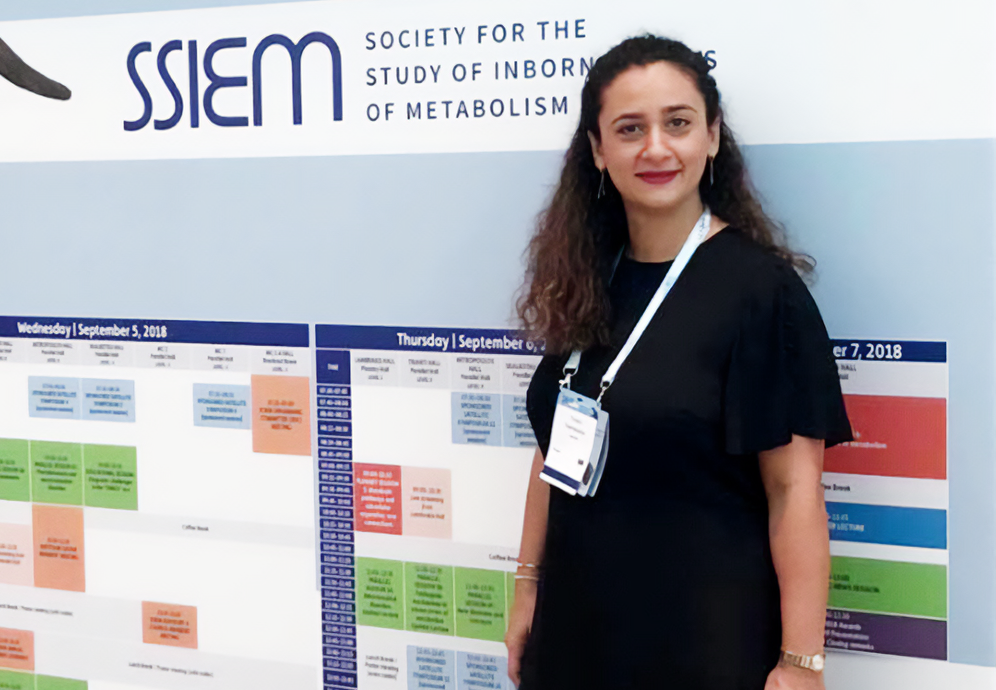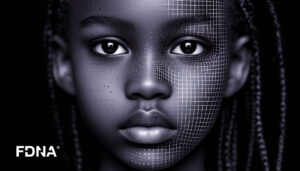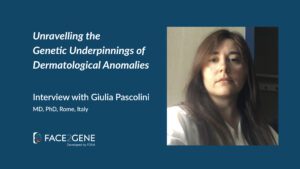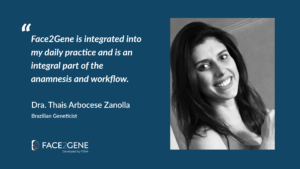Dr. Tinatin Tkemaladze is the Head of the Department of Molecular and Medical Genetics at Tbilisi State Medical University, the largest medical university in Georgia. She also is a practicing clinician with expertise in rare diseases, especially those presenting dysmorphisms and neurodevelopmental delay. Recently, she was selected to be a board member of the European Society of Human Genetics (ESHG).
She took time from her busy schedule to speak with us about the field of genetics in Georgia, how she uses Face2Gene in her practice and the importance of an early diagnosis.
FDNA: First, congratulations on being selected as a board member of the ESHG. How do you feel about that?
Dr. Tkemaladze: Being a board member of the ESHG is a great honor and responsibility, since I am the first physician from Georgia to achieve that. I applied for this position in order to promote my country in an international medical society and contribute to further development and awareness of human genetics in Georgia. This is very important, because, just as in many other countries, the awareness about the different rare diseases is still deficient. Many non-geneticists still do not ‘think genetic’ and find it difficult to recognize specific syndromes, so to raise awareness about this is very, very important and I hope integration in ESHG from this perspective will further help.
FDNA: In your practice, do you think awareness is one of the main challenges to diagnose a rare genetic syndrome?
Dr. Tkemaladze: I would say so. 15 years ago, genetics as a separate subject didn’t even exist at our university. At the time when I was a student, I was never taught medical genetics.
When the Department of Molecular and Medical Genetics was established at our university, I had just finished my PhD and was invited to be a teacher. This is when I had to dive and fall in love with genetics. But so many doctors who finished university 10 or 15 years ago, they simply were not taught genetics. I think this is one of the major challenges we face and the reason why often the diagnosis may be missed.
Another challenge for diagnosing genetic conditions is the fact that genetic tests are still quite expensive, especially for a resource-limited country like Georgia. But through participation in international clinical trials and research or sponsored projects, free testing is offered to patients with certain diseases. We try to promote this information among doctors and tell them: “okay, we have a program for skeletal dysplasia or epilepsy that will be free of charge”. And then, they start referring more patients and diagnosis is established in many. I am happy to see the stable increase in awareness for last several years, which is due to improved education and research opportunities.
FDNA: You said that tests are expensive. How Face2Gene helps with this?
Dr. Tkemaladze: Face2Gene helps a lot. There is no ‘one, perfect’ test that can detect all types of genetic abnormalities and choosing the right test is very important. Especially when you are from a country where the resources are lacking and there are many destitute people. As clinicians, we should try to think and choose the most appropriate diagnostic test.
Often, in Georgia, because of significant price difference we may opt for panels instead of exomes, and it’s very important to choose the right panel. When I see patients with dysmorphic features, I upload the portrait into Face2Gene. If the app shows a high score for a certain syndrome or even if it shows top 5-10 syndromes with similar scores, this helps me to narrow down the list of possible syndromes and ensure the needed genes are included in the list of panels and increase the diagnostic yield.
Face2Gene also helps me to interpret results with VUS (variants of unknown significance) because sometimes exomes or panels report several variants in genes causing overlapping syndromes. How to differentiate between them? Face2Gene is very, very helpful in this aspect.
FDNA: Can you give me an example?
Dr. Tkemaladze: Yes, this is one of my favorite case, and actually it will be published soon. The story is about a child with developmental delay and very peculiar facial features, whose parents are first cousins and the grandparents from each side are also third cousins (double consanguinity). Due to this fact I had a strong suspicion of a recessive disorder. But then I uploaded the patient’s photos to Face2Gene and it showed a very high match to Coffin-Lowry Syndrome, which is a X-linked dominant disease.
I was somehow surprised, I thought maybe the program is not working well enough since I was expecting a recessive disorder. But then I discussed the case with the foreign colleague who completely agreed on the clinical diagnosis of Coffin-Lowry syndrome and offered to analyze RPS6KA3 gene (which is the only causative gene for this syndrome) within his research study and the mutation was indeed there. It was a de-novo mutation that has no relation to parental consanguinity.
That was a life lesson for me because often when we see consanguinity we narrow down our clinical judgement for recessive disorders and disregard the possibility of de novo mutations. But when you have this nice tool, Face2Gene, it enables you to think broader and not to be biased.
FDNA: Do you think Face2Gene could also help improve the awareness and referral of other medical specialties?
Dr. Tkemaladze: Definitely. Before the pandemic, we had several in-person workshops on how to navigate and operate with Face2Gene for medical professionals. The feedback was excellent, and doctors were very happy and comfortable to use this tool. Later on, I was receiving feedback from my colleagues like: “I saw a patient, and this is the syndrome that matched, what do you think?” Face2Gene creates this feeling for non-geneticists to be more comfortable with rare syndromes with morphology disorders.
No one knows every syndrome, especially non geneticists. When they have this simple and nice tool on hand, they get more confidence. It’s easy, it’s free, provides suggestions and effectively shortens time to diagnosis.
FDNA: What is the importance of an early diagnosis in rare genetic disease?
Dr. Tkemaladze: Diagnosis in general is important and early diagnosis specifically, because some conditions are treatable, and we should strive to have a diagnosis as early as possible.
Some people may even argue that many rare genetic diseases are not curable. Some say: “If you cannot correct the gene, what’s the use of doing this?” But then you see these families who have gone through so many doctors and they have spent so much money for unnecessary investigations which consume so much of their time, resources and energy.
At the end of the day parents are frustrated that their child has problems and no one can explain what’s behind it. When you don’t have a diagnosis, how do you know if it is treatable or not? I would say that it’s a misconception that genetic diseases are not treatable. Some are and I am sure, with the new developments and tools, many more will be in the near future – this is my vision.
Also, often parents of undiagnosed children tell me that they are afraid to have another child because they don’t want the disease to recur. When we have the diagnosis, we are able to give accurate risk estimations. The families with inherited conditions may opt for prenatal or preimplantation genetic testing, whereas those with de novo mutations will feel more confident to proceed further without any additional tests, since the recurrence risk in this case is less than 1%. In Georgia most of the population does not practice consanguinity and the majority of genetic diseases I observe are due to de novo mutations. Having healthy children is so important!
Moreover, information about the causation of the disease goes much beyond just the diagnosis for the parents or the patients. For example, a boy may have an X-linked recessive condition and he may have unaffected sisters who themselves may be at risk to be carriers with further recurrence risk in their future children. When we have the diagnosis, then this risk can be surely avoided.
I would say that medical genetics is a very special field of medicine, where our concern is not only an affected patient, but also other, sometimes distant, family members, bringing a sensitive issue of ethics as well.
FDNA: It really helps to improve lives then?
Dr. Tkemaladze: I always say that Face2Gene is not only for geneticists, but it’s useful for any healthcare provider or medical student. It is so important for doctors to detect and recognize dysmorphism, and then it takes only one minute to upload the photo, another minute to put the symptoms and in three minutes they may have a suggestion of a possible diagnosis.
I am happy and honored to be part of the scientific advisory board of FDNA.
FDNA: And we are honored to have you!



